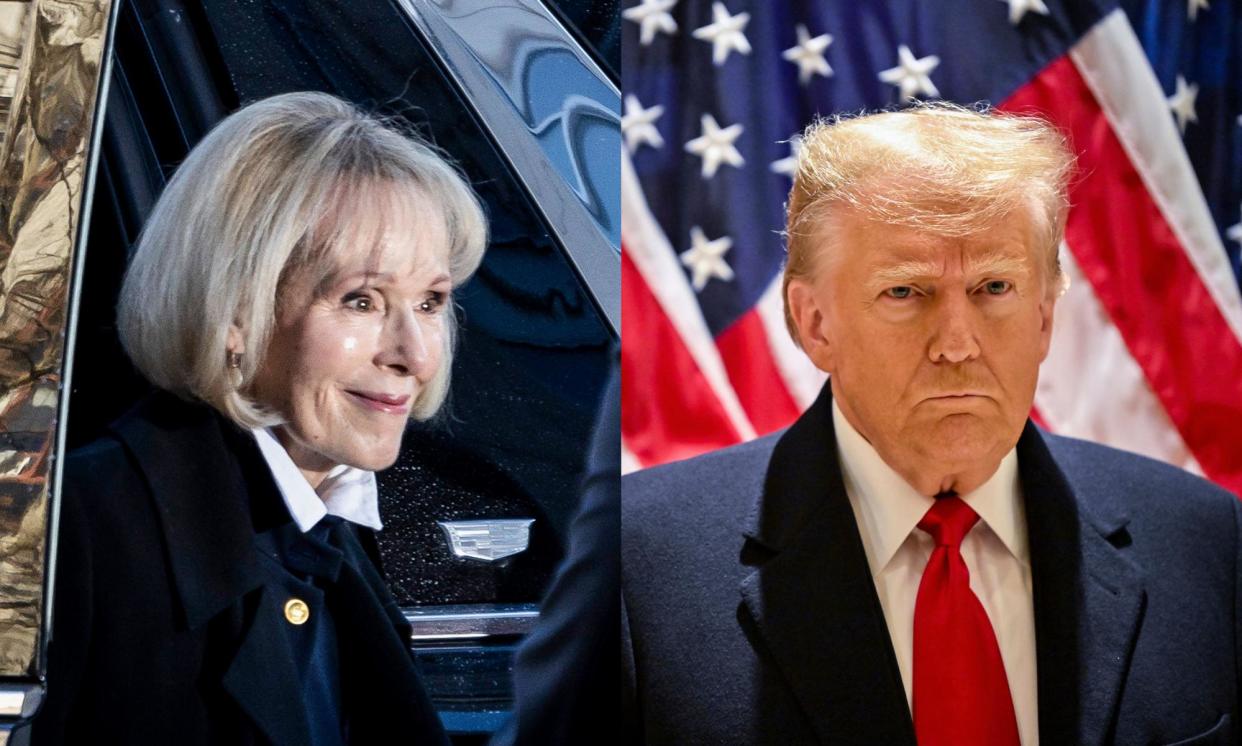Tantrums and threats: key takeaways from Trump’s E Jean Carroll trial

- Oops!Something went wrong.Please try again later.
- Oops!Something went wrong.Please try again later.
E Jean Carroll won $83.3m in her New York defamation trial against Donald Trump. The decision on Friday came some nine months after another Manhattan federal court jury awarded Carroll $5m in a separate defamation and sexual assault trial against Trump.
In 2019, Carroll came forward with a rape claim against Trump in her then forthcoming book, What Do We Need Men For? A Modest Proposal, an excerpt of which ran that June in New York magazine. Trump responded to Carroll’s claim – that he sexually assaulted her in a high-end department store dressing room around early 1996 – by saying she was a dishonest political operative.
Related: Trump’s campaign trail runs via the courthouse – and he’s fine with that
Carroll sued him for defamation, as the statute of limitations barred her from suing over the assault. When a New York law in 2022 granted accusers a one-year window to sue their abusers for incidents outside the civil statute of limitations, Carroll commenced another civil action – this time for the assault and his defamatory statements about her post-presidency.
That lawsuit went to trial in April 2023; as the jury found that Trump sexually abused and defamed her, Judge Lewis Kaplan decided that these findings would be accepted as fact in this second trial. As they were, jurors only weighed damages.
Here are some key moments from the proceedings:
Carroll described reputational ruin and threats following Trump’s denials
Similar to her testimony at the first trial, Carroll said that the tone of Trump’s denials destroyed her reputation and, by impugning her as dishonest, laid waste to her journalism career. “I’m here because Donald Trump assaulted me, and when I wrote about it, he said it never happened,” Carroll said.
“He lied, and it shattered my reputation,” she also said, at another point, testifying: “I expected him to deny it, but to say it was consensual, when it was not. But that’s what I expected him to say.”
Carroll said that Trump’s denials from his prominent platform spurred threats
“The thing that really got me about this was, from the White House, he asked if anyone had any information about me, and if they did, to please come forward as soon as possible, because he wanted the world to know what’s really going on – and that people like me should pay dearly,” she told jurors.
Carroll was presented with some of those threats on the stand. “I hope you die soon. I hope someone really does attack, rape and murder you,” one message stated. Another missive read: “Rape Jean rape jean.”
Carroll said she took protective measures following the threats
The writer said that she got a pit bull that roams leash-less on her property. “He now patrols very eagerly and enthusiastically,” Carroll told the court. Carroll also said she bought bullets for a gun that she inherited from her father.
Asked where she kept the gun, Carroll said: “By my bed.”
Trump’s lawyer tried to discredit Carroll with her writing
The ex-president’s lead attorney on this case, Alina Habba, tried to discredit the former Elle columnist – who wrote about relationships and sex – by pointing to her cheeky tweets and social media posts. “Did you ever post any tweets that could be considered sexually explicit?” Habba asked.
While that question was shot down with a sustained objection, Habba hammered on.
“Ms Carroll, what does this say: ‘What CAN be done about the penis? It gets large when you want it small, and stays small when you want it large,’” Habba asked, showing a 2013 tweet. “Those were your words, correct?”
Carroll answered in the affirmative and also said yes when Habba asked whether she had posted that question to social media. “You discussed penises?” Habba said shortly thereafter. Carroll replied, “Yes.”
Trump had tantrums in court
Trump repeatedly had outbursts in court as Carroll testified, her lawyers told Judge Kaplan. “The defendant has been making statements again [that] we can hear at counsel table,” Shawn Crowley, one of her attorneys, said. “He said it is a ‘witch-hunt’, it really is a con-job.”
Trump testified for about two minutes
Because Judge Kaplan had ruled that this trial would not re-litigate Carroll’s rape and defamation claims, the jury was only charged with assessing damages. As a result, Kaplan limited what Trump’s lawyers could ask him, as well as the extent of his answers.
One of the questions Habba was permitted to ask was: “Do you stand by your testimony in the deposition?”, in which Trump had rejected Carroll’s claims. “One hundred percent, yes,” Trump said.
“Did you deny the allegation because Ms Carroll made an accusation?” Habba asked, presaging the beginning of trouble for Trump.
“That’s exactly right. She said something, I consider it a false accusation. No difference,” Trump responded, spurring an objection from Carroll’s lawyers. Kaplan deemed that every word following “yes, I did” would be stricken.
The next exchange didn’t go that well, either. “Did you ever instruct anyone to hurt Ms Carroll in your statements?”
“No. I just wanted to defend myself, my family, and frankly, the presidency,” Trump said, prompting still another objection. Kaplan said that everything after “no” be stricken, which meant that jurors had to disregard this commentary.

